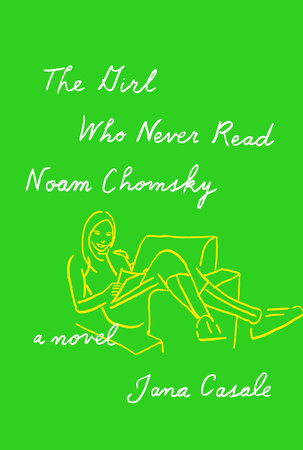They fill the offices in New York city publishing houses, twenty-somethings who majored in creative writing. They fill the acquisitions department with treacle that resonates with them, so sure that the rest of the reading world will also vibrate to the buzz of a twenty-something creative writing student facing so many taxing problems. Like if she's fat. If her submission to the prestigious literary rag will be accepted. If she should buy a bagel or a jelly donut.
We've been here before, haven't we, with THE LIGHT WE LOST.
And like that earlier incarnation, I have given up, but well before page 145.
"What do we have but yet another young New Yorker examining the lint in her navel and imagining that it is fascinating for us all" I said back then, and it's still true in THE GIRL WHO NEVER READ NOAM CHOMSKY. The problems are the same small, petty, insignificant dross. This novel is the bleating of an elitist who has not experienced life. It makes for a boring tale.
Again, the prose is lovely. And again, it's the fecking story. There isn't much there.
To repeat: "Sure there are those who enjoy a soap opera, or those who are twenty-something elitists in New York who believe their problems have deep relevance to the world. I am not one of them. This is not a book for me. Sorry, Penguin Random House. You gave me the book for a review, but I can't finish it. I wouldn't inflict this on anyone I know because they like good books with substance. If you're wondering why book sales are down, well, you can start here."
It still holds true for this particular presentation of elitist problems.
Sunday, March 25, 2018
Friday, March 09, 2018
The Italian Teacher: A Book Review
He has a way with words, author Tom Rachman, a lyrical quality that entices a reader to suspend disbelief and enter the world of Pinch Bavinsky, the solitary hero of THE ITALIAN TEACHER.
The protagonist is the son of a Jewish bundle of neuroses who hates her mother (a requisite character trait these days, it seems) and a narcissistic artist whose time comes and goes over the course of the novel. Religion does indeed figure in this novel, however, but it is Pinch who is the true believer, worshipping his ne'er-do-well father. It is a faith that forms the son and guides his choices, for good or ill.
Pinch grows up in the shadow of the famous man who is too busy bedding women to take much heed of his son, although they do form a rather tight bond, the origins not discovered until later. Such is the stuff that drives a narrative that is quite compelling, as the reader goes along for a rather sad ride through the life of Pinch, with all its misery and inability to form relationships.
His is the solitary life, his focus centered on getting his father's attention while trying to avoid his somewhat unstable mother's smothering. A young man full of enthusiasm for art ends up as a language teacher, his life's course plotted by a father whose motivations are unclear until you reach the end - but it's that kind of tension that keeps you turning the page.
The prose is so lovely that you'll despair of ever being able to write nearly as well, and the story at times so far-fetched that you almost can't believe the path it has taken, but it's a delight all the same. The conclusion is a tribute to true love and the tight bonds of friendship, the sort of ending that you'd hoped for as you discover more about Pinch, his father, and his mother.
This was one of those rare books that I stayed up well past bedtime to finish, a pleasure to read.
The protagonist is the son of a Jewish bundle of neuroses who hates her mother (a requisite character trait these days, it seems) and a narcissistic artist whose time comes and goes over the course of the novel. Religion does indeed figure in this novel, however, but it is Pinch who is the true believer, worshipping his ne'er-do-well father. It is a faith that forms the son and guides his choices, for good or ill.
Pinch grows up in the shadow of the famous man who is too busy bedding women to take much heed of his son, although they do form a rather tight bond, the origins not discovered until later. Such is the stuff that drives a narrative that is quite compelling, as the reader goes along for a rather sad ride through the life of Pinch, with all its misery and inability to form relationships.
His is the solitary life, his focus centered on getting his father's attention while trying to avoid his somewhat unstable mother's smothering. A young man full of enthusiasm for art ends up as a language teacher, his life's course plotted by a father whose motivations are unclear until you reach the end - but it's that kind of tension that keeps you turning the page.
The prose is so lovely that you'll despair of ever being able to write nearly as well, and the story at times so far-fetched that you almost can't believe the path it has taken, but it's a delight all the same. The conclusion is a tribute to true love and the tight bonds of friendship, the sort of ending that you'd hoped for as you discover more about Pinch, his father, and his mother.
This was one of those rare books that I stayed up well past bedtime to finish, a pleasure to read.
Subscribe to:
Posts (Atom)

